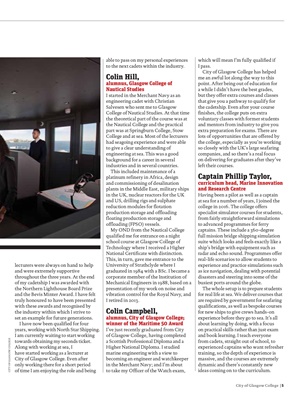
City of Glasgow College | 5
CITY OF GLASGOW COLLEGE
lecturers were always on hand to help
and were extremely supportive
throughout the three years. At the end
of my cadetship I was awarded with
the Northern Lighthouse Board Prize
and the Bevis Minter Award. I have felt
truly honoured to have been presented
with these awards and recognised by
the industry within which I strive to
set an example for future generations.
I have now been qualified for four
years, working with North Star Shipping.
I am currently waiting to start working
towards obtaining my seconds ticket.
Along with working at sea, I
have started working as a lecturer at
City of Glasgow College. Even after
only working there for a short period
of time I am enjoying the role and being
able to pass on my personal experiences
to the next cadets within the industry.
Colin Hill,
alumnus, Glasgow College of
Nautical Studies
I started in the Merchant Navy as an
engineering cadet with Christian
Salvesen who sent me to Glasgow
College of Nautical Studies. At that time
the theoretical part of the course was at
the Nautical College and the practical
part was at Springburn College, Stow
College and at sea. Most of the lecturers
had seagoing experience and were able
to give a clear understanding of
engineering at sea. This was a good
background for a career in several
industries and in several countries.
This included maintenance of a
platinum refinery in Africa, design
and commissioning of desalination
plants in the Middle East, military ships
in the UK, nuclear reactors for the UK
and US, drilling rigs and sulphate
reduction modules for flotation
production storage and offloading
floating production storage and
offloading (FPSO) vessels.
My OND from the Nautical College
qualified me for entrance on a night
school course at Glasgow College of
Technology where I received a Higher
National Certificate with distinction.
This, in turn, gave me entrance to the
University of Strathclyde where I
graduated in 1984 with a BSc. I became a
corporate member of the Institution of
Mechanical Engineers in 1988, based on a
presentation of my work on noise and
vibration control for the Royal Navy, and
I retired in 2013.
Colin Campbell,
alumnus, City of Glasgow College;
winner of the Maritime 50 Award
I've just recently graduated from City
of Glasgow College, having completed
a Scottish Professional Diploma and a
Higher National Diploma. I studied
marine engineering with a view to
becoming an engineer and watchkeeper
in the Merchant Navy; and I'm about
to take my Officer of the Watch exam,
which will mean I'm fully qualified if
I pass.
City of Glasgow College has helped
me an awful lot along the way to this
point. After being out of education for
a while I didn't have the best grades,
but they offer extra courses and classes
that give you a pathway to qualify for
the cadetship. Even after your course
finishes, the college puts on extra
voluntary classes with former students
and mentors from industry to give you
extra preparation for exams. There are
lots of opportunities that are offered by
the college, especially as you're working
so closely with the UK's large seafaring
companies, and so there's a real focus
on delivering for graduates after they've
left their courses.
Captain Phillip Taylor,
curriculum head, Marine Innovation
and Research Centre
Having been a pilot as well as a captain
at sea for a number of years, I joined the
college in 2016. The college offers
specialist simulator courses for students,
from fairly straightforward simulations
to advanced programmes for ferry
captains. These include a 360-degree
full mission bridge shipping simulation
suite which looks and feels exactly like a
ship's bridge with equipment such as
radar and echo sound. Programmes offer
real-life scenarios to allow students to
experience and practice simulations such
as ice navigation, dealing with potential
disasters and steering into some of the
busiest ports around the globe.
The whole setup is to prepare students
for real life at sea. We deliver courses that
are required by government for seafaring
qualifications, as well as bespoke courses
for new ships to give crews hands-on
experience before they go to sea. It's all
about learning by doing, with a focus
on practical skills rather than just exam
and book learning. I teach everyone
from cadets, straight out of school, to
experienced captains who want refresher
training, so the depth of experience is
massive, and the courses are extremely
dynamic and there's constantly new
ideas coming on to the curriculum.